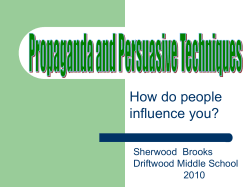
PROPAGANDA versus persuasion
PROPAGANDA versus persuasion What is propaganda • “Propaganda is the deliberate, systematic attempt to shape perceptions, manipulate cognitions, and direct behavior to achieve a response that furthers the desired intent of the propagandist.” • —Jowett & O'Donnell, Propagand a and Persuasion Government propaganda Five characteristics of propaganda • Propaganda is in the eye of the beholder. – “I’m persuading. The other guy is using propaganda.” • Propaganda has a strong ideological bent. – example: PETA, Queer Nation, or the Army of God • Propaganda is institutional in nature. It is practiced by organized groups – governments, corporations, social movements, special interests • Propaganda relies on mass persuasion – television, radio, Internet, billboards • Propaganda tends to rely on ethically suspect methods of influence. – deception, distortion, misrepresentatio n, or suppression of information. Propaganda in “abstinence” based sex education • Washington Post, December 2, 2004: • School children participating in federally funded abstinence-only programs have been taught “false, misleading, or distorted information” over the past three years. • Included in the misinformation were claims that: – HIV, the virus that causes AIDS, can be spread via sweat and tears. – Condoms fail to prevent HIV transmission as often as 31 percent of the time in heterosexual intercourse – half the gay male teenagers in the United States have tested positive for the AIDS virus – touching a person's genitals "can result in pregnancy" Common propaganda techniques • plain folks appeal (“I’m one of you”) • testimonials (“I saw the aliens, sure as I’m standing here”) • bandwagon effect (everybody’s doing it) • card-stacking (presenting only one side of the story) • transfer (positive or negative associations, such as guilt by association) • glittering generalities (idealistic or loaded language, such as “freedom” “empowering,” “family values”) • name calling (“racist,” “tree hugger,” “femi-nazi”) plain folks appeal • Based on the “common man,” “person on the street” or the “little guy” • A politician calls himself a “populist” or “man of the people” • “In this time of change, government must take the side of working families.” (George Bush, address at the Republican National Convention, Sept. 3, 2004. testimonials • Anecdotal evidence for diet pills, herbal remedies, newage crystals, etc. • Anecdotal evidence of alien abductions, psychic phenomena • “I saw what looked to be a hairy human figure, about 6-6 1/2' tall, running behind my bike. Scared the crap out of me, so I hit the throttle and did what I could to get out of there.” (from the Bigfoot Field Researchers Organizations Website, report # 13424 Jarod Fogle for Subway bandwagon effect • a “herd” mentality, following the crowd, or “counting heads” • An employee caught pilfering says, “everyone else does it.” • “A majority of Americans - 57% - say they believe in psychic phenomena such as ESP, telepathy or experiences that can’t be explained by normal means.” (CBS poll, April 28, 2002) transfer • Projecting good or bad qualities from one person or group onto another • The positive or negative association will “rub off” on the other person or group • Politicians posing next to the flag, with troops, with veterans to appear patriotic • An ad for a dietary supplement features a researcher in a white lab coat with a clip board to make the product appear more scientific glittering generalities • Using virtuous words; democracy, freedom, justice, patriotism, family values, motherhood, progress • Embracing values at a high level of abstraction – “change” – “green” – “reform” • “patriotism is always more than just loyalty to a place on a map or a certain kind of people. Instead, it is also loyalty to America’s ideals – ideals for which anyone can sacrifice, or defend, or give their last full measure of devotion.” Barack Obama, June 30, 2008 name calling • Ad hominem attacks • tree-hugging liberals, right-wing zealots, femi-nazis, bureaucrats • Barack Obama “palls around with terrorists.” • “Despite the hysterics of a few pseudo-scientists, there is no reason to believe in global warming” Rush Limbaugh, See I told You So (1993) • “secular progressives made great inroads over the past five years" and "if you don't believe that ... you're a moron." Bill O’Reilly, Dec 19, 2005, on his syndicated radio show, the Radio Factor
© Copyright 2025





















